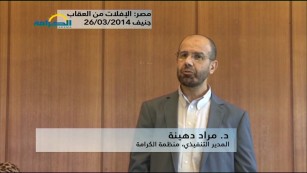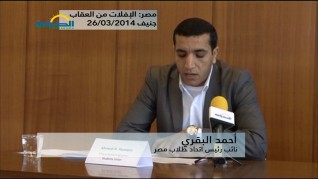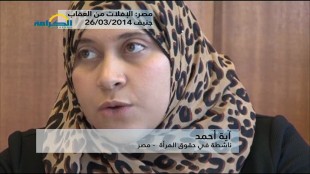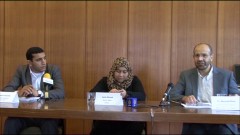Home » Algeria » EGY - News » Impunity is not an option; Ensure accountability for mass killings in Egypt
Mourad Dhina presented this report which he described as being "in line with the statement made by 27 European countries" under Item 2 at the 25th session of the UN Human Rights Council which highlights the "need for accountability" for the killing of protestors in the country.
Ever since the military takeover on 3 July 2013, there has been a systematic killing of protesters who express their opposition to the government. The Egyptian authorities' disregard of the right to life – a permanent feature since the outset of the 25 January 2011 revolution – took a dramatic turn on 14 August 2013, with the violent dispersal of the Rabaa and Nahda sit-ins.
"States have a duty to investigate, investigations which must meet specific standards set out in international human rights law", said Dr Dhina. Alkarama's report reviews the work of Egyptian prosecutors, after examining first-hand evidence of cases of violations committed against pro-Morsi demonstrators, concludes that investigation by the judiciary has failed to meet these standards. This means that it cannot ensure accountability of the perpetrators of the violations to the right to life which have occured in Egypt since 3 July 2013.

|
Mourad Dhina said that "Alkarama is disappointed that the UN Office of the High Commissioner for Human Rights has not set up a fact finding mission like it did for Togo (2005), Kenya (2008) or Honduras (2009)" and that "Alkarama calls on the UN Human Rights Council to establish a commission of inquiry into the death of protesters which have occurred since the military takeover".
Ahmed Al-Bakri, the Vice President of the Egyptian Students Union, then spoke about the situation of students in Egypt – where large numbers have been detained, killed, tortured and sentenced to death, as documented by his organization over the past few months. He reported that since 3 July 2013, the number of students unlawfully detained has reached 1531 and that five students had died under torture while in detention. He further said that the storming of universities had now become a common feature in Egypt.

|
Mr Al-Bakri requested the international community to call for the release of students who were arbitrarily detained, prosecute those responsible for these serious abuses and set up a fact-finding committee to investigate cases of torture and enforced disappearances. Mr Al-Bakri added: "Egypt has lost its way and the human rights convetions guaranteeing freedom of opinion and expression that it promised to respect have lost all meaning because of the lack of legal control and respect for human rights". Or something to that affect".
Finally, Aya Ahmed, an Egyptian women rights' activist, told the audience about cases of human rights violations committed against women and girls since 3 July 2013, ranging from executions to arrests, administrative detentions, torture and unfair trials. She reported that since July, around 50 women have been killed during peaceful protests, 1500 arrested, 100 detained and 53 sentenced to prison sentences following unfair trials. One of the most striking examples she mentioned was the one of a 14-year-old girl charged with the killing of 55 police officers.

|
"Most abuses against women happen after the arrest, at the police station," Aya said. They are subjected to beatings, insults, sexual harassment, and other types of mistreatment and torture. The authorities frame them in cases, with charges of "carrying weapons", "gathering without a legal permission", and "killing of officers" without any evidence being brought forward. "Even making the Rabaa sign has now become a crime in Egypt," she said. She also has documented many cases of women held in administrative detention, such as the high-profile case of the women of Al Mansoora.
She also condemned the fact that "since the military coup, there has been no investigation (...) and even the Commission of Inquiry was completely biased". She added "Accountability must be ensured and we need to combat the impunity of police and army officers".
Given the scale of violations committed against the civilian population in Egypt in August 2013, and the escalation of violence since then, Alkarama calls on the international community to ensure that accountability is ensured in Egypt, for those that have already suffered abuses, but most importantly, to prevent further violations. We will continue to follow developments in the human rights situation in the country closely and documenting and diffusing information about the occurrence of violations internationally in order to ensure the international community remains seized of this matter.
 Algeria
Algeria Bahrain
Bahrain Djibouti
Djibouti Egypt
Egypt Iraq
Iraq Palestine/Israel
Palestine/Israel Jordan
Jordan Kuwait
Kuwait Lebanon
Lebanon Libya
Libya Mauritania
Mauritania Morocco
Morocco Oman
Oman Qatar
Qatar Saudi Arabia
Saudi Arabia Sudan
Sudan Syria
Syria Tunisia
Tunisia United Arab Emirates
United Arab Emirates Yemen
Yemen Other Countries
Other Countries


